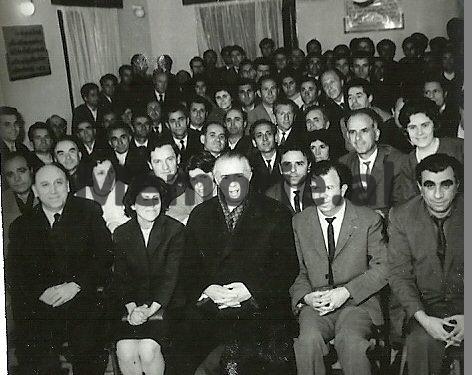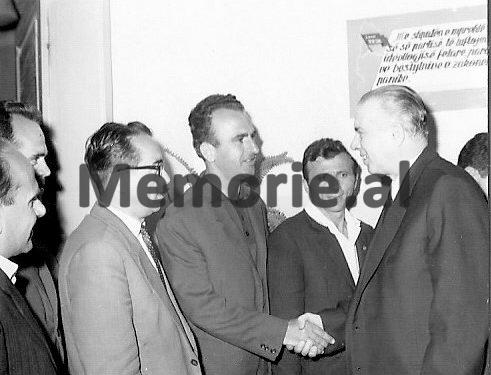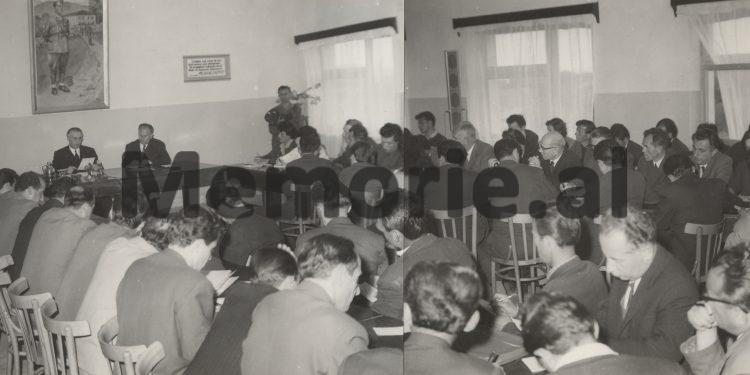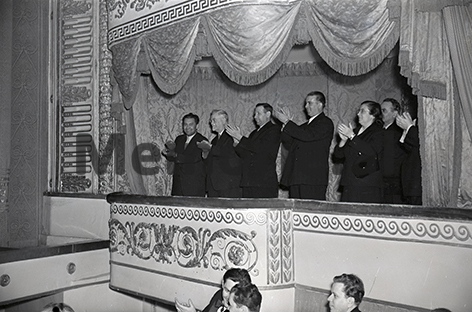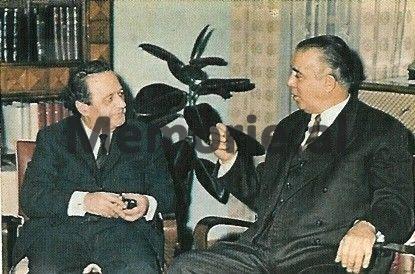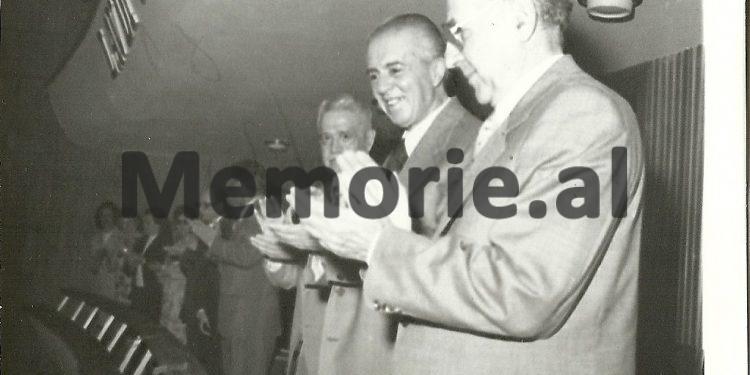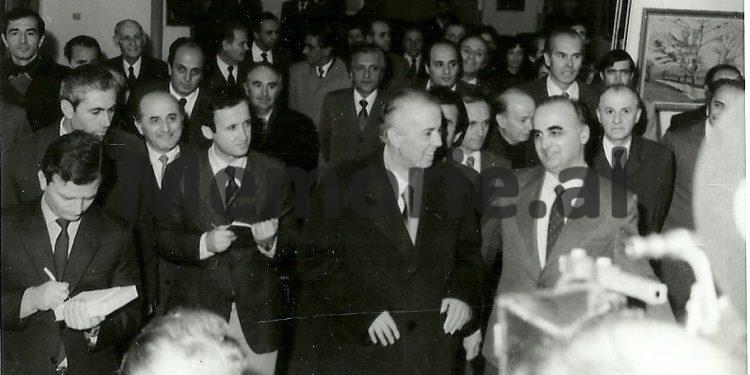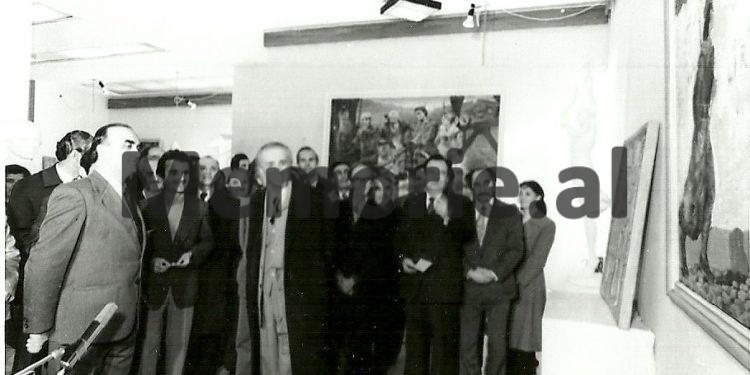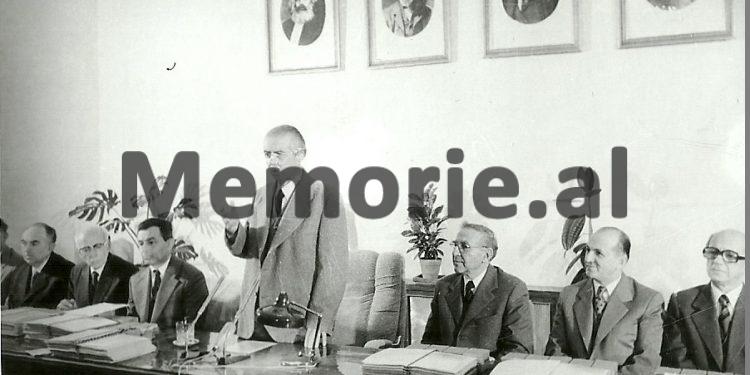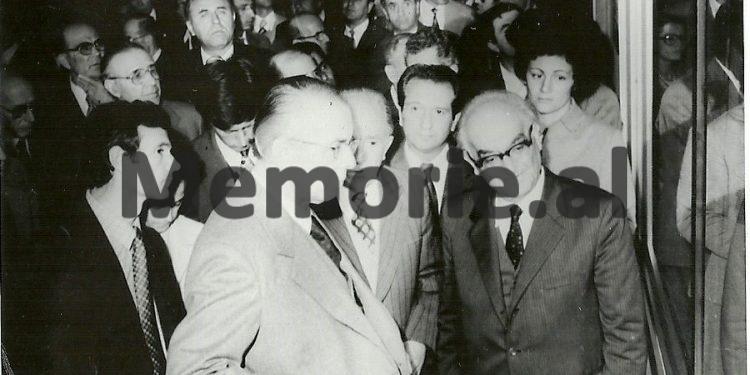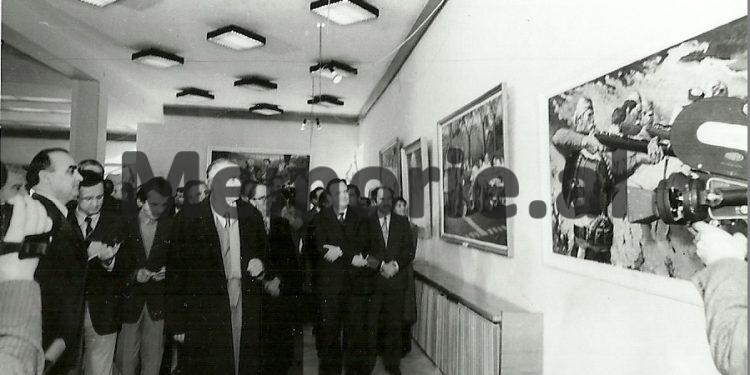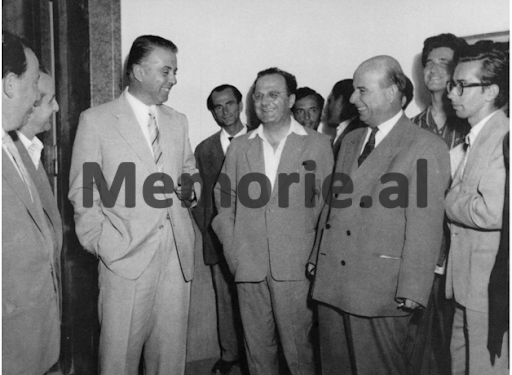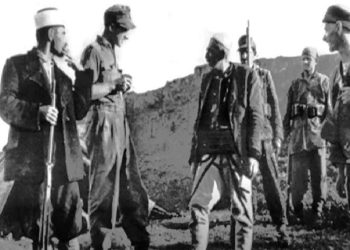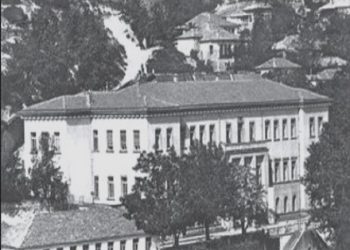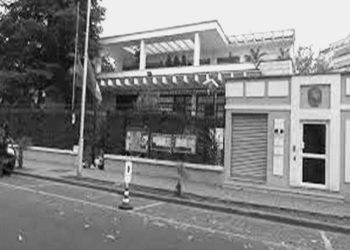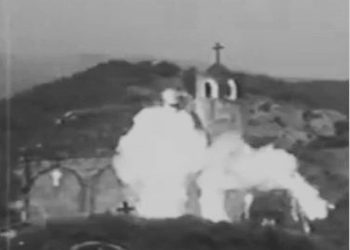Dashnor Kaloçi
Memorie.al publishes an unknown archival document extracted from the Central State Archive in Tirana, (fund of the former Central Committee of the ALP), which belongs to 1957, where there is a record of a meeting of Enver Hoxha with a group of writers and artists from the most famous of that time, starting from: President of the League of Writers and Artists of Albania, Dhimitër Shuteriqi, writers Kole Jakova, Sterjo Spasse, Nonda Bulka and Llazar Siliqi, sculptors and painters Vangjush Miho , Photo by Stamo and Kristina Hoshi, composers Prenk Jakova and Çesk Zadeja, etc. The full minutes of that meeting with the conversation held between Enver Hoxha with the most famous writers and artists, which took place one day before the first Congress of Writers and Artists of Albania, which was also attended by a member of the Politburo and Deputy Prime Minister Spiro Koleka.
“Let’s take for example the works of comrade Vangjush Mio because I know him as old, together with Nonda we had teachers. He has a lot of pictures and sketches where the characteristics of our popular style have come out well. Therefore formally we do not want architects in this meeting. We specifically want you, as an engineer, to encourage them to work closely with the painters and when they come down to see the life of the people instead and to put this spirit into their sketches. They should not work only according to books. Keep in mind the economic side as well, but this does not lead you to create blocks without much taste and beauty. I think the national characteristics of our constructions are not such that they cost much to build. In all fields such as literature, art, architecture, work must be done and works must be created that the people love, understand and feel “.
This was stated, among others, by Enver Hoxha in a meeting held with writers and artists on May 15, 1957, attended by some of the most famous personalities and names of art, culture and literature of that time, starting with the President Of the League of Writers and Artists of Albania, Dhimitër Shuteriqi, writers Kole Jakova, Sterjo Spasse, Nonda Bulka and Llazar Siliqi, sculptors and painters Vangjush Miho, Foto Stamo, Kristina Hoshi, composers Prenk Jakova and Çesk Zadeja and others, etc. of the Politburo and Deputy Prime Minister Spiro Koleka.
Regarding the conversations that Enver Hoxha had with that group of writers and artists, some of the most famous personalities of Albanian art, culture and literature who were a day before the first Congress of the League of Writers and Artists, the archival document introduces us with the process- the minutes of that meeting, which Memorie.al publishes for the first time.
Minutes of the conversation between Enver Hoxha and a group of writers and artists on May 15, 1957
May 15, 1957
After a warm atmosphere is created for the guests, Comrade Enver Hoxha takes the floor.
COMRADE ENVER: Tomorrow we will have your congress which will be of great importance for our country. How did the preparations go? Did you prepare, Comrade Dhimitër?
DHIMITËR SHUTERIQI: The preparations are multifaceted. It has been ten years since we have been working as writers. But the preparations could have been made even better if we had worked in an even more organized way.
COMRADE ENVER: But which of you is ahead in creativity, but realistically tell us, writers, composers, or painters?
DHIMITËR SHUTERIQI: Composers have done a good job. Even painters, though fewer of us writers. Yet we too do not fall down, we are close and close to each other. We are very good when compared to the past, especially in poetry and drama. Conditions made these develop a little in the past. Poets, both as work and as production, have done more, because poetry itself attracts more people. Our literature is still young and has weaknesses. Yes despite all the weaknesses we have a good thing. I have also been to Czechoslovakia and Hungary. Compared to these countries we have a much more ideologically compact literature. We still have professional weaknesses, but our literature is unanimous and compact. The unanimity of our literature on the problems that arise is especially evident in relation to the defense of socialist realism. Although some of us, some time ago, foreign symptoms appeared, but they have not endangered our literature.
COMRADE ENVER: What do you writers have in hand now?
DHIMITËR SHUTERIQI: There will be many literary productions this year.
LLAZAR SILIQI: These next two years will be years of growth. As it is known, a number of our works were completed in 1954, and in 1955 and 1956 our people have made even more preparations and now the new production will start.
COMRADE ENVER: Now the state is in a period where there are more opportunities to help you. You also have some reasons to cry. I know that in addition to your works in most cases the works of younger writers have also been published, but young people should be encouraged even more. As I have been told there are plenty of products from young people, though not all of them are of great value. However, if we had more opportunities, it would be good to have enough of them published as well. It is important that even the publication of a poem in the newspaper pushes one to move forward. As you know, the situation has improved in this regard now and we hope that it will improve even more in the future. Writing novels and dramas is important, but so are musical creations. You, Preng, have made the opera music for Skanderbeg very beautiful. I believe you have finished it now.
PRENG JAKOVA: I am finishing, I have only the last act.
COMRADE ENVER: I’m not competent but I like music. From music only the stone is not touched. What are you painters doing? Here, here, we have Vangjush Mion as the oldest painter, “golak” because he has great experience.
PHOTO STAMO: After the congress we will organize an exhibition of works by Vangjush Mios.
COMRADE ENVER: I believe that many of the old paintings have been sold to private individuals, but the main thing for you is that the buyer should be the state.
PHOTO STAMO: Now there is interest in paintings from state bodies, from mass organizations, while from individuals the interest is small.
COMRADE ENVER: The state will also help you with the sale of works of art. Comrade Spiro Koleka remarks that the friends of the Writers ‘and Artists’ League had not brought any architects to the meeting.
COMRADE ENVER: Comrade Spiro criticizes that you have not brought any architects here. Our artists who have to give new constructions the national color seem to me to have a wide field of action and I think that no one has prevented them from seeing the reality, the style of our people, the characteristics of our folk art which you find in the cities of Albania as in Shkodra, Berat, Gjirokastra etc. This has not been taken into account by our architects. In addition, they do not even collaborate closely with painters and sculptors; my opinion is that these as in all genres have given and are giving a rich material to architects as well. Let’s take for example the works of comrade Vangjush Mio that I know him as old, together with Nonda we had teachers. He has a lot of pictures and sketches where the characteristics of our popular style have come out well. Therefore formally we do not want architects in this meeting. We specifically want you, as an engineer, to encourage them to work closely with the painters and when they come down to look at the life of the people and to put this spirit in their sketches. They should not work only according to books. Keep in mind the economic side as well, but this does not lead you to create blocks without much taste and beauty. I think the national characteristics of our constructions are not such that they cost much to build. In all fields such as literature, art, architecture, work must be done and works must be created that the people love, understand and feel.
KRISTINA HOSHI: Is it possible for me to speak a little?
COMRADE ENVER: Order!
KRISTINA HOSHI: I want to talk about this issue. I think it is not only the architects but also the painters and sculptors who are to blame. Although they should be more interested in the first place because they have the economic side in hand. If they inform us when a building is made, it would be beneficial, because together we would think about the decorations and many beautiful things would come out. But the point is that the architects themselves try to produce works at very low cost and thus make decorations with no architectural value. Therefore, we think, architects should also consider the issue of decorations, sculptures, etc. The experience of the people should be better used and thus worked for a national architecture.
DHIMITËR SHUTERIQI: We have a very simple architecture, still undeveloped. Generally our village and town architecture is very simple, so from this side we would not have much difficulty. But I think that not only the financial side hinders, the artist’s courage and artistic tradition in our architecture have also been lacking.
COMRADE SPIRO KOLEKA: I wanted to make something if you allow me. Before us there were only two or three architects, so their work was difficult to leave traces, because where to leave the Italian architecture. Now something has started to happen to us. But sculptors should also seek the cooperation of architects. We will consider the economic side of the constructions in the future as well, but when the sculptors cooperate with the architects, this will definitely make the architect think in what style he will do the work and he will be charged at the same time and it will be helped, that the engineer ‘given the idea finds a place to insert a decoration or a frame, or something characteristic. Yes the Artists League has done very little in this regard. I found some characteristic things, some frames in stone, from the constructions in Qafë Murr, or from Dibra, etc., I took them in pictures and took them to our artists. Therefore, you artists also need to do more because we find it difficult to apply sculpture on a large scale. Here in the Central Committee palace we could have had something more striking. In this building we have not saved money but you have not offered to cooperate. Sculpture for our country is a new thing, while architecture is richer, denbabaden, the other is that we have not created the national style, so in Idea field there is a lot of room for you.
PHOTO STAMO: We have had several conversations about this; we have made special reports on the development of our architecture by introducing national motifs, now we have started to introduce many ornaments. We will discuss this issue in congress, but our architects are influenced by foreign motives, and we have many beautiful things, our own, that we can take. In this regard, special studies should be done by the Institute of Sciences. In the handicraft museum I have seen dozens of albums that had many ornaments on which young artisans relied. The tools are not lacking and now the desire exists.
COMRADE ENVER: So there is a possibility, more have been created and will be created. The development of art and culture must go progressively with the construction of socialism. Many things are moving forward, but we also need to take steps in all directions. Along with the construction of factories, with the advancement of agriculture people will also prosper and you know culture and art, all genres of literature and art will play a crucial role in beautifying the soul of people and their lives . These issues have always been taken care of by the Central Committee of our Party to help the arts and literature, and in case not enough has been done you should understand that the situations have been difficult. We, the comrades of the Central Committee, have been for helping our writers, composers, painters, artists, artisans to have the minimum conditions to create as much as possible. It is true that there have been obstacles and we cannot say that there are not, but nevertheless measures have been taken and we will try to take others. Overall our view is that you have made efforts in your development and given to the people. We all understand that to be a writer, painter or composer and to be affirmed for a short time is difficult, it takes time. Mastery in all branches is very broad and we can never conclude that we fully master it and can quite easily derive what we want to be perfect. This view should be fought, but in the right way and not by measures. To writers and poets we must be prudent that the nature of work is such. But this does not mean that they should not be helped, it is a reality that, despite the fact that in our country we do not have any great authority in these branches, arts and literature, led by Marxism-Leninism and the right work of the Party, as he said Comrade Shuteriqi, they had ideological compactness in the sense that every creation is in the way of the people. And there is no greater satisfaction for all of us and for you when your deeds and thoughts fall into the hands of the people and serve them. Now we have to walk and we will walk this path. You will have the help of the Party and the government every day. Your efforts to participate in building the new life of the people are to be commended. Your Congress should become an important event in the life of our people, i.e. it should not remain just a matter of yours, of a group of writers, artists or composers if it deeply affects the entire cultural life of the country. The Party should take this seriously. Let your Congress be such that the working masses see in you a rush to move forward and an ardent desire to be supported and to further develop the straight line we have followed. We tell you that you will have the great support of the Party, that the issue of art and culture is related to the life of the people. We have found that in terms of novels, dramas, stories, novels you have published many things and in my opinion some novels, such as Shuteriq, Sterjo Spasses, or Fatmir Gjata, etc., are very good. Now we should not make comparisons that we would be wrong to compare with the best novelists of the USSR or France. I have the opportunity to follow French literature, there are also things that are not worth it at all and many of these do not just come out of the pen of decadent authors; there are those to whom even the party newspapers make good reviews. There are some of these works that have not impressed me and if we compare them with many novels by Albanian writers, they are nothing. But of course we cannot make comparisons with the great French writers. The point is that the novels of our writers have won the sympathy of the people and the people have read them diligently, so we must walk this path because if we walk like this we will not have results. A novel, in order to be good, must reflect the reality of the time, but such a novel cannot be made by shutting itself inside. It’s not just about you; the Central Committee beats the Hammer for all writers and artists to put down. There may be some writers who are overwhelmed enough to just sit in the room, pick a topic, and get the job done. Then they think: “To fill it I am a great psychologist, I know the literary currents, the views, and the struggle of the people below. I can own another month at the base and fix it myself.” If an educational novel really comes out that should reflect people’s struggle with feelings, sentiments it is necessary to live with the people. Otherwise it cannot be done. Why are our great poets, like Naimi, Çajupi, etc., liked so much? Who are the colossi of our literature? You also have to learn a lot from them. Naimi has lived abroad, in suffering, sick, with a small clerk, but with as much fire and longing, as much art and love he has written for the homeland. We all know and cherish his poems. i.e. he was driven by the desire for the liberation of the homeland that suffered under the yoke of the Turks, while in the struggle for the liberation of the beloved homeland we did it ourselves and we see it grow we have all the opportunities, more than Naimi had, to write works beautiful. But for this it is necessary to be in the pure source of the people and to be inspired, and surely works will come out that will inspire our people and future generations to build communism. Some friends had sent me some discs from Czechoslovakia and I put a part of Bedrzi Smetana. That day I had in my hands “November” where a part of Çajup was written which spoke about the heroic gorges of Kurvelesh, about the turnips of that place; to tell the truth, my hair stood on end because I thought of the war, this province has done that in the past, in the partisan war, the war of the women of Kurvelesh who fought with chitians, with black headscarves and double-breasted alongside and dozens of our friends here and in all parts of Albania. Such inspiration, such a resource is so great that it cannot be said, our people like these because they have fought all their lives. Such topics can be resolved even today that the past of our people is brilliant and it should not be forgotten that the National Liberation War is related to the past wars of our people. This war was waged by the same people who waged it, and the first wars and the communists who led the people’s national liberation war were the sons of the people, so the past should not be separated from the present. In the life of the people, then, there are such themes that can inspire our writers, painters, composers, etc. and to produce truly excellent works. In this regard there should be cooperation, e.g. comrade Kristo Kono has done a work for Labëria, but if there was a good poem about Labëria, a truly heroic music would come out for our people. We are convinced that if you connect even more with the people, your deeds will turn out to be really realistic. Even what you have done is realistic, but the job is to really express the situation, the war, and the contradictions that people face and to help open the way to a solution for them. So in this regard it is necessary from all of you, especially from you who have experience, to inspire future generations with their works to create for the people. Therefore have the courage to criticize the weaknesses of your deeds, certainly not in a denigrating way, but as the Party teaches us and not to be pleased with each other’s criticism given that it is worthwhile for you to do deeds of mira. We have faith in this regard that you, like all of us, belong to the people, you care about their life and well-being, and you have in mind that your work is extremely important. We can do a lot of conferences for the workers of the Mati Hydropower Plant, but when a good novel comes out then it will mobilize them in the example of positive characters. I have read the Soviet novel “Cement” which is a good novel, but it talks about another country and this may not attract enough of our working masses. What if a writer, ours, came to live and work in the masses not in order to build the hydropower plant, but to join the lives of the workers and write a novel about them, think how much it will serve to build socialism Albania. These are the first hydropower plants; in the future plans will be built other equally large and even larger. Therefore, with our literary and artistic works, we train such working-class cadres to build them. So to get into working class life. Let’s take the textile workers. There are tangible, amazing things there. Before they were closed girls or shepherdesses, many of them did not even know how to write, and now they have taken over modern cars. Carefully follow an old man when he comes from the village to the combine and listen to what he says when he meets his daughter who works with all those cars and in all that noise. So look at how the Party has changed the people. Our industry will develop even more in the future. Combines will be made much bigger than this, the textile factory of Shkodra will be enlarged, we will set up factories for the production of silk, wool, etc. Memorie.al
Continues in the next issue




